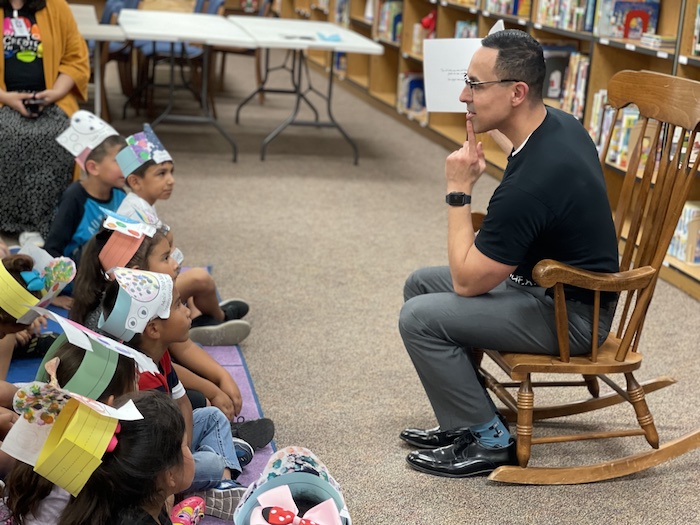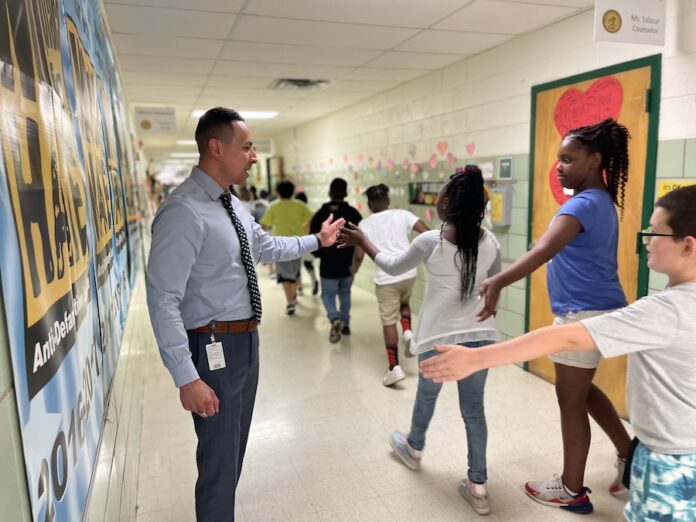Leaders at Seguin ISD have convinced voters to approve more than $200 million in construction bonds since 2019. Superintendent Matthew Gutierrez says making—and strengthening—connections with the community has been his Texas district’s key to success at the ballot box in 2019, 2022 and 2023.
He and his team have spent a lot of time out in the community—which is about 35 minutes from San Antonio—sharing the stories of students and their needs. “I’m proud that our community has come to see the importance of investing in students. That is something Seguin has struggled with in some cases,” says Gutierrez, who just named a regional superintendent of the year and has been leading Seguin ISD since 2017. “What really got us over the finish line in these past three bonds was just being able to build that support and trust in the school system.”
Seguin ISD spent the $67 million bond passed in 2019 on technology infrastructure, a new football stadium and the extensive renovations of an aging middle school. Three years later, voters approved a massive $131 million bond to replace the district’s oldest elementary schools and build an agricultural science facility.
More from DA: Crackdown on cellphones expands as 2023-24 school year approaches
Without the latter building, students have had to keep their animals at home, a relative’s house or elsewhere. Also part of that package are safety upgrades and renovation of the transportation facility to accommodate rapid growth in the community filling up with new residents from Austin and San Antonio seeking more affordable housing.
Every classroom will also get new furniture to improve learning experiences and serve as a teacher recruitment and retention tool and help Seguin ISD keep pace with neighboring districts. “In many cases, the furniture in our classrooms is decades old, and, in some cases, the same age as the facility,” Gutierrez explains. “Oftentimes, a teacher will come and interview, be offered a job and tour the camps, but then decline because they interviewed in a district nearby that has newer classrooms and newer furniture.”
The passage of this year’s much smaller bond, which will fund a new baseball and softball complex, was particularly gratifying as athletic facilities have been a tough sell with voters in recent years, Gutierrez notes.
“When you work with students, you have to be willing to advocate fiercely for what they need,” he adds. “You need the courage to go into your community to ask for their support, you need the courage to have crucial conversations with others, and you need the courage to advocate for what is needed to fund public education.”
Seguin ISD stays connected
Gutierrez, like many of his fellow superintendents, is concerned about staffing and funding, and how the latter impacts the former. Texas’ legislature did not increase education this year. Seguin iSD currently has 15 teacher vacancies and seven of those are in math.

“A year ago I told my team, ‘It’s scary to think about what staffing is going to look like a year from now,” he says. “It’s even scarier to think about what staffing is going to look like a year from now.”
The state did mandate new school safety measures, many of which are unfunded, leaving K12 leaders to cover the costs on their own at the same time districts are working to provide expanded mental health care and provide more wraparound services for students and families. Meanwhile, superintendents in many districts are finding themselves caught in the middle of extreme political divisiveness and the spread of misinformation in their communities, he adds.
“I often talk about the superintendency pre-COVID, the superintendency during COVID and the superintendency post-COVID, I would say the superintendency post-COVID is probably the most challenging,” he concludes. “Seguin is a very conservative community, so there has been potential for almost anything to become a controversy. We’ve been able to avoid that because of the strong partnership we have with our parents and with our community keeping them apprised of what we’re doing in the school district.”










